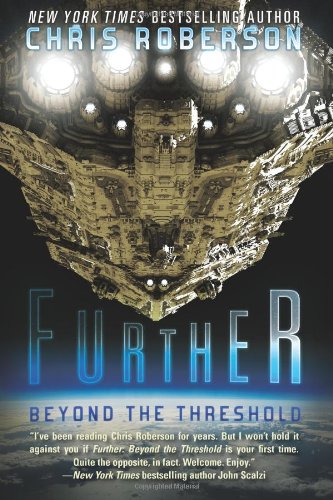
![]() Further: Beyond the Threshold by Chris Roberson
Further: Beyond the Threshold by Chris Roberson
Some premises are so great that authors can’t resist trying them out again. In Further: Beyond the Threshold, Chris Roberson tries his hand at Charlton Heston waking up from cryogenic sleep in the distant future. Well, actually, our hero is Captain Ramachandra Jason Stone, who left earth in the 22nd century to journey to Alpha Centauri B. He wakes up over ten thousand years later, when Further begins.
Roberson is aware of the connections between his work and his predecessors, and Captain Stone regularly describes the science fiction that he read and watched with his father as a boy. Planet of the Apes, for example, is acknowledged almost before the reader has learned the main character’s name.
Though reverent, Further is more than homage. My favorite twist is that Stone awakes to discover that humanity has already journeyed to the stars using wormholes. Stone’s voyage, though still admirable, is less momentous than he might have hoped. He is not very disappointed. It is the future, after all, and, fortunately, there are even intelligent primates. All of the animals are intelligent now, which is why the future is called the “Human Entelechy.” Even sharks can do calculus now. Cows still chew their cud, but they are insulted when Stone is reluctant to afford them the same status that he reserves for humans.
Further clearly recalls Planet of the Apes in its premise, but its mood is more akin to Lewis Carroll’s Alice in Wonderland or even an episode of Doctor Who (which Stone also remembers watching). Most of the characters bicker over how to afford sentient and sub-sentient creatures rights and dignity. At times, these groups, such as the Anachronists and their attempt to mimic the past, are amusing. However, it does little for the plot, which largely consists of amiable conversation about the future.
In other words, the plot is not very adventurous. Captain Stone eventually finds his way to a laser gun, a spaceship, and a threatening community called the Iron Mass, but he spends the majority of the novel learning about what is going on around him. He encounters many enjoyable sci-fi concepts, such as distributed consciousnesses and Panspermia, but none of them are treated with much urgency. There is some political maneuvering happening in the background of the future’s Human Entelechy, but the details remain, at best, murky. If a plot requires conflict, Further’s plot does not start until perhaps the final third of the novel, when Stone is asked to go on another mission to a distant part of space.
I was surprised by how agreeable Captain Stone was throughout his journey in the future. He rarely seemed awestruck, suspicious, or threatened. I suppose this might be why he was such an ideal choice for cryogenic sleep and exploration: nothing bothers him. However, Stone seems to have forgotten that even Charlton Heston was known to drop his cool, from time to time. I kept waiting for Stone to find his own Statue of Liberty.
In Further: Beyond the Threshold, Chris Roberson offers his take on a popular premise, but he offers little in the way of adventure and character development. This is a novel for those sci-fi fans that cherish exposition and abstract exploration in their sci-fi.
I listened to Brilliance Audio’s production of Further: Beyond the Threshold, which was narrated by Jeff Crawford. Crawford offers an intuitive reading of this strange sci-fi novel. The voices that he adopts for the various sentient life forms of the future never took me out of the story, which I found impressive. Sadly, his Australian accent is less convincing.



I find if I take every Trek reference out of them (the title, the character names, the ship names, etc.),…
I loved this deep dive into Edwige Fenech's Giallo films! Her performances add such a unique flavor to the genre.…
It would give me very great pleasure to personally destroy every single copy of those first two J. J. Abrams…
Agree! And a perfect ending, too.
I may be embarrassing myself by repeating something I already posted here, but Thomas Pynchon has a new novel scheduled…